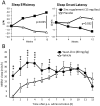Dietary Zinc Acts as a Sleep Modulator
- PMID: 29113075
- PMCID: PMC5713303
- DOI: 10.3390/ijms18112334
Dietary Zinc Acts as a Sleep Modulator
Abstract
While zinc is known to be important for many biological processes in animals at a molecular and physiological level, new evidence indicates that it may also be involved in the regulation of sleep. Recent research has concluded that zinc serum concentration varies with the amount of sleep, while orally administered zinc increases the amount and the quality of sleep in mice and humans. In this review, we provide an exhaustive study of the literature connecting zinc and sleep, and try to evaluate which molecular mechanism is likely to be involved in this phenomenon. A better understanding should provide critical information not only about the way zinc is related to sleep but also about how sleep itself works and what its real function is.
Keywords: brain; nutrition; randomized controlled trial; sleep; zinc.
Conflict of interest statement
The authors declare no conflict of interest.
Figures

References
-
- Tamakoshi A., Ohno Y. Self-reported sleep duration as a predictor of all-cause mortality: Results from the JACC study, Japan. Sleep. 2004;27:51–54. - PubMed
Publication types
MeSH terms
Substances
LinkOut - more resources
Full Text Sources
Other Literature Sources

